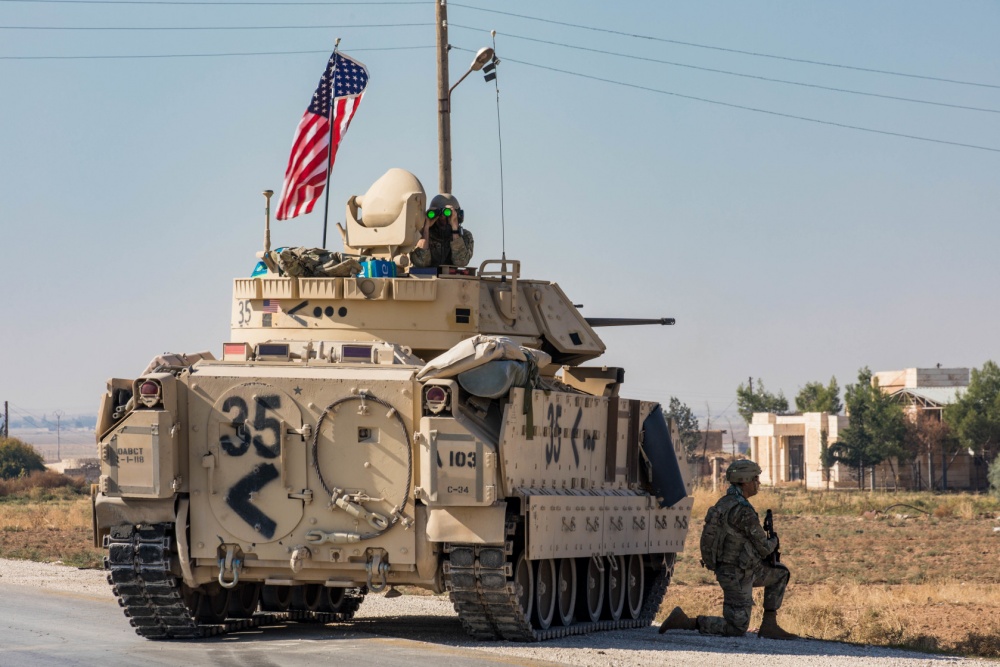The US can’t deal with China while it’s mired in the Middle East

‘Great nations do not fight endless wars’, US President Donald Trump declared in his 2019 State of the Union speech. He had a point: military entanglements in the Middle East have contributed to the relative decline of American power and facilitated China’s muscular rise. And yet, less than a year after that speech, Trump ordered the assassination of Iran’s most powerful military commander, Qassem Soleimani, bringing the United States to the precipice of yet another war. Such is the power of America’s addiction to interfering in the chronically volatile Middle East.
The US no longer has vital interests at stake in the Middle East. Shale oil and gas have made the US energy-independent, so safeguarding Middle Eastern oil supplies is no longer a strategic imperative. In fact, the US has been supplanting Iran as an important source of crude oil and petroleum products for India, the world’s third-largest oil consumer after America and China. Moreover, Israel, which has become the region’s leading military power (and its only nuclear-armed state), no longer depends on vigilant US protection.
The US does, however, have a vital interest in resisting China’s efforts to challenge international norms, including through territorial and maritime revisionism. That is why Trump’s predecessor, Barack Obama, promised a ‘pivot to Asia’ early in his presidency.
But Obama failed to follow through on his plans to shift America’s foreign-policy focus from the Middle East. On the contrary, the Nobel Peace Prize laureate staged military campaigns everywhere from Syria and Iraq to Somalia and Yemen. In Libya, his administration sowed chaos by overthrowing strongman Muammar Gaddafi in 2011. In Egypt, Obama hailed President Hosni Mubarak’s 2011 ouster.
Yet in 2013, when the military toppled Mubarak’s democratically elected successor, Mohamed Morsi, Obama opted for non-intervention, refusing to acknowledge it as a coup, and suspended US aid only briefly. This reflected the Obama administration’s habit of selective non-intervention—the approach that encouraged China, America’s main long-term rival, to become more aggressive in pursuit of its claims in the South China Sea, including building and militarising seven artificial islands.
Trump was supposed to change this. He has repeatedly derided US military interventions in the Middle East as a colossal waste of money, claiming the US has spent $7 trillion since the 9/11 terrorist attacks. (Brown University’s costs of war project puts the figure at $6.4 trillion.) ‘We have nothing—nothing except death and destruction. It’s a horrible thing’, Trump said in 2018.
Furthermore, the Trump administration’s national security strategy recognises China as a ‘strategic competitor’—a label that it subsequently replaced with the far blunter ‘enemy’. And it has laid out a strategy for curbing Chinese aggression and creating a ‘free and open’ Indo-Pacific region stretching ‘from Bollywood to Hollywood’.
Yet, as is so often the case, Trump’s actions have directly contradicted his words. Despite his anti-war rhetoric, Trump appointed war-mongering aides like Secretary of State Mike Pompeo, who has been described as a ‘hawk brimming with bravado and ambition’, and former national security adviser John Bolton, who in 2015 wrote an op-ed titled ‘To stop Iran’s bomb, bomb Iran.’
Perhaps it should be no surprise, then, that Trump has pursued a needlessly antagonistic approach to Iran. The escalation began early in his presidency, when he withdrew the US from the 2015 Iran nuclear deal (which Iran had not violated), reimposed sanctions, and pressured America’s allies to follow suit. Furthermore, since last May, Trump has deployed 16,500 additional troops to the Middle East and sent an aircraft-carrier strike group to the Persian Gulf, instead of the South China Sea. The assassination of Soleimani was part of this pattern.
Like virtually all of America’s past interventions in the Middle East, its Iran policy has been spectacularly counterproductive. Iran has announced that it will disregard the nuclear agreement’s uranium-enrichment limits. Trump’s sanctions have increased the oil-import bill of US allies like India and deepened Iran’s ties with China, which has continued to import Iranian oil through private companies and invest billions of dollars in Iran’s oil, gas and petrochemical sectors.
Beyond Iran, Trump has failed to extricate the US from Afghanistan, Syria or Yemen. His administration has continued to support the Saudi-led bombing campaign against Yemen’s Houthi rebels with US military raids and sorties. As a result, Yemen is enduring the world’s worst humanitarian crisis.
Trump did order troops to leave Syria last October, but with so little strategic planning that the Kurds—America’s most loyal ally in the fight against the Islamic State terror group—were left exposed to an attack from Turkey. This, together with his effort to strike a Faustian bargain with the Afghan Taliban (which is responsible for the world’s deadliest terrorist attacks), threatens to reverse his sole achievement in the Middle East: dramatically diminishing IS’s territorial holdings.
Making matters worse, after ordering the Syrian drawdown, Trump approved a military mission to secure the country’s oil fields. The enduring oil fixation also led Trump last April to endorse Libyan warlord Khalifa Haftar, just as Haftar began laying siege to the capital, Tripoli.
The Trump administration is unlikely to change course anytime soon. In fact, it has now redefined the Indo-Pacific region as extending ‘from California to Kilimanjaro’, thus specifically including the Persian Gulf. With this change, the Trump administration is attempting to uphold the pretence that its interventions in the Middle East serve US foreign-policy goals, even when they undermine them.
As long as the US remains mired in ‘endless wars’ in the Middle East, it will be unable to address in a meaningful way the threat China poses. Trump was supposed to know this. And yet, his administration’s commitment to a free and open Indo-Pacific seems likely to lose credibility, while the cycle of self-defeating American interventionism in the Middle East appears set to continue.